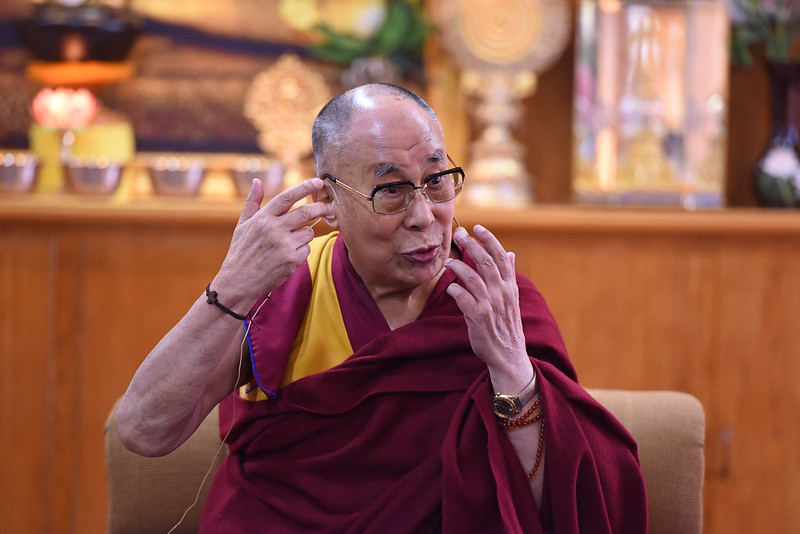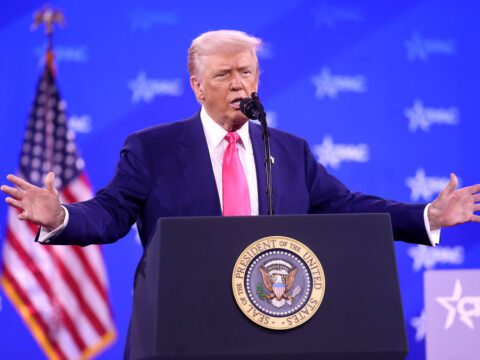A viral video of the Dalai Lama kissing a young boy sparked accusations of sexual abuse and pedophilia, but some members of the Tibetan and Buddhist communities say the spiritual leader did not cause harm. The video, taken in Dharamsala, India in February, shows the Dalai Lama, 87, kissing the boy and asking him to suck his tongue. Outrage on social media last month led the Dalai Lama to issue an apology on Twitter. Some consider the concern over the interaction as a cultural norm that was lost in translation.
“In Tibetan culture, the grandparents and elders are very close to children. It is a very common custom to kiss anybody on the mouth, especially children, for which there is a kind of understood innocence both ways,” says Angela Sumegi, an associate professor of humanities and religion at Carleton University. Sumegi’s expertise is in Indo-Tibetan Buddhism.
Sumegi says Tibetan elders play an old cultural game with young children where they pass candy between each other’s mouths. When there are no treats left, elders will tell children they can eat their tongue. However, in the video, the Dalai Lama says the boy can “suck” his tongue.
“It was a very unfortunate mistranslation of a Tibetan phrase,” says Sumegi.
Sumegi says the Tibetan community has suffered from the negative attention. “It’s a very sensitive issue within the Buddhist community that I belong to,” she says.
Samphe Lhalungpa, the chair of the Canada Tibet Committee, also says the controversy has been painful for their community, especially given the boy’s excitement at meeting the Dalai Lama. “He’s such an important symbol of both peace and of faith. It basically undercuts us,” Lhalungpa says.
He says people outside their culture who were reacting on the internet were not looking at the totality of the events.
“I think there are ways to look at it and say ‘We didn’t understand that. That was not in our frame of culture – can you explain what’s the significance?’” says Lhalungpa. “You have to take the trouble to have a little more reflection.”
But not everyone agrees. The Survivors’ Network of Those Abused by Priests (SNAP), said in a statement that they were “horrified” by the Dalai Lama’s actions.
“Our primary concern is with the innocent boy who was the subject of this disgusting request by a revered spiritual figure,” they said.
Writer and policy analyst Anushay Hossain also took issue with the gesture, writing in a piece for Newsweek that the spiritual leader “just gave us all a great lesson in how you can be a revered person, and still be in the wrong.”
“Even if we want to give the Dalai Lama the benefit of the doubt, we can’t,” she wrote. “Just watch the video and pay attention to how it makes you feel. It looks wrong and feels wrong because it is wrong.”
Henry Shiu, an assistant professor in Chinese Buddhist studies at the University of Toronto, points out that the ceremony where the Dalai Lama kissed the boy was intended for people to receive a blessing from the leader.
Shiu says that in another video that was not circulated as widely as the viral video, both the boy and his mother, who was seated nearby, expressed happiness at meeting the Dalai Lama.
He says sexual misconduct has been part of Buddhists’ past and the Dalai Lama has acknowledged the sexual abuse monks perpetuated against their students.
“We do need voices to raise concern and protect children,” says Shiu. “I’m not saying that the criticizing voices are completely inappropriate. They should be doing what they’re doing. But at the same time they should take a full look at the context of what did happen.”
Sumegi says it is natural for people to want to decide the “right way” to look at this. However, “we have to acknowledge that from one perspective, this was a very disturbing moment,” she says. “But then we have to ask, why was this a disturbing moment?”
More On Broadview:
- Experts offer churches advice on how to help prevent clergy abuse
- After more than 30 years, this clergy abuse survivor is finally being heard
- Sexual misconduct survivor decries ‘another breach’ of trust by Anglican church leadership
Sumegi points out that many critiques of the Dalai Lama’s actions from the dominant culture come down to “a different experience of sexual abuse of children coming from clerics.” Whereas in the Tibetan culture, “there is no problem because they are familiar with [the Dalai Lama] and know his intention.”
Many critiques on social media and in opinion pieces compared the actions of the Dalai Lama to the ongoing sexual abuse in the Catholic Church.
Sumegi says people are seeking an absolute answer, but that would be exerting the influence of one culture over the other.
“I don’t think we can definitively say ‘this is how to perceive it.’ We can only say this is how to understand these different perspectives,” she says.
If you or someone you know has experienced sexual abuse, please contact this helpline:
WAVAW 24-Hour Crisis and Information Line
- (604) 255-6344
- https://www.wavaw.ca/get-support/
***
Sherlyn Assam is Broadview’s associate digital editor and a Canadian freelance writer currently based in the U.K.















Often we impose our cultural beliefs and norms on others. Each culture, as each religion, feels that it’s beliefs and ways of thinking are “truth.” But we must understand that simply because we feel something is right and correct for us and in our religion or culture, it does not mean that we have the right to impose our values on another culture.
“it does not mean that we have the right to impose our values on another culture.” Absolutely! Who are we to judge the forcing of women to wear a hijab in Iran, stoning for adultery in Afghanistan or the death penalty for homosexuality in Uganda, or female genital mutilation?! Im being sarcastic btw.
I completely disagree. Yes there are cultural differences and traditions that can by misundunderstood, but this child is not a grandchild of the the Dalai Lama and very obviously does not want to be kissed on the mouth by him. This is not mutual affection. This is power over. His face is forcefully pulled forward as he tries to pull back from the kiss. The Dalai Lama uses more force, grabbing his whole body to get him to suck (or eat) his tongue. This is also a saying in that culture. Not an act.